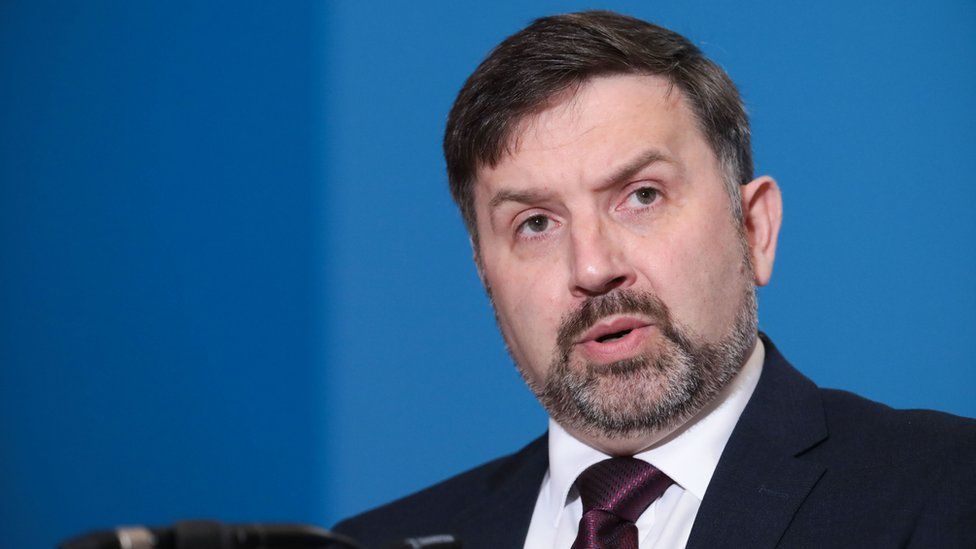Coronavirus: NI health minister warns of new restrictions
- Published
- comments

Northern Ireland's health minister has said he will be recommending Covid-19 restrictions to the executive to curb the increasing spread of the disease.
Robin Swann said "we have to step in now" to deal with a rise in new cases.
On Wednesday, 34 new Covid-19 cases were confirmed by the Department of Health. No deaths were announced so its death toll remains at 559.
Mr Swann said he will make recommendations to help "arrest" the spread when ministers meet on Thursday.
He suggested these may include reducing the number of people who can meet in a household.
Decisions on restrictions will be made after ministers have taken advice from the Northern Ireland Chief Medical Officer Dr Michael McBride and Chief Scientific Adviser Prof Ian Young.
Both men told BBC Radio Ulster they believed changes to current Covid-19 rules were likely after Thursday's executive meeting.
In other developments:
- It has been confirmed school bus services will resume next week. Limited services will run from 24-28 August, with priority given to pupils in years 7, 12 and 14. Normal services will resume from 1 September.
- Jury trials have recommenced in Northern Ireland for the first time since lockdown.
Northern Ireland's rate currently showed 24 cases per 100,000 over the past 14 days, evidence that pointed to the virus spreading again, he added.
There had been a tenfold increase in new infections since the beginning of July, he said, with almost 300 new cases being confirmed in Northern Ireland in the past week.
It comes as 34 new cases of coronavirus have been confirmed in Northern Ireland in the past 24 hours, according to Department of Health figures.
There have been no further deaths linked to it in the same period.
Meanwhile, the Republic of Ireland's Department of Health recorded two deaths from the virus and an additional 54 cases.
There has now been a total of 1,775 Covid-19 related deaths in the country and 27,547 cases.
"At the beginning of July, it was three to four cases per day - that's risen to the point where it's been between 40 and 45 cases per day," said the chief scientific adviser.
He warned that if the current trend was allowed to continue it would "inevitably" lead to more hospitalisations and deaths.
- A SIMPLE GUIDE: How do I protect myself?
- IMPACT: What the virus does to the body
- ENDGAME: How do we get out of this mess?
- WITHOUT SYMPTOMS: The mystery of 'silent spreaders'
Dr McBride warned the pandemic was "a long, long way from over", adding that the public needed to show the "the same, if not greater commitment as before" to curb the current rise in cases.
Northern Ireland was likely to see some changes in terms of the restrictions "that we have taken for granted" in recent months, he told BBC Radio Ulster's The Nolan Show.
On Tuesday, Stormont's Department of Health confirmed there had been one further coronavirus-related death, bringing its death toll to 559.
This rise in cases is concerning and clearly that's why we saw Robin Swann, Dr Michael McBride and Prof Ian Young - yesterday do a media briefing.
The language used was plain: The health minister warned that Northern Ireland was in danger of sliding down a treacherous slope.
If this rise in cases continues - almost 300 in a week, 41 cases in the past 24 hours, according to Prof Young - it's inevitable that hospital admissions and deaths will rise.
However, we need to keep it in context. It is worth noting that hospital admissions remain in single figures, and the majority of those testing positive are young and coping with symptons at home.
The briefing was used to jolt the public into remembering that we are still in this pandemic.
There could be an opportunity for the the so-called health trio to perhaps advise the executive that they might have to reintroduce some restrictions.
We're not due to hear any more about easing until the end of August, so what we could see emerging is what has happened in the Republic of Ireland, where they've reduced the number of people allowed at gatherings in gardens, and in outdoor activities.
Health authorities in Dublin have reined in a lot of those restrictions, saying they have to because of the spike.
Mr Swann said there was no one trend to explain the recent rise in case numbers - otherwise it would be easier to act.
"We cannot put our finger on any specific, either location, or activity or industry, as to a cause of the number of increases and positive tests we have seen."
He also refused to rule out a return to full lockdown in the coming months.
In the Republic of Ireland, the chair of the National Public Health Emergency Team's (NPHET) Irish Epidemiological Modelling Advisory Group has warned that unless the country moves collectively and firmly to prevent further transmission of Covid-19, "we will see case numbers rise to a level that is unsustainable".
- Published19 August 2020
- Published18 August 2020
- Published17 August 2020